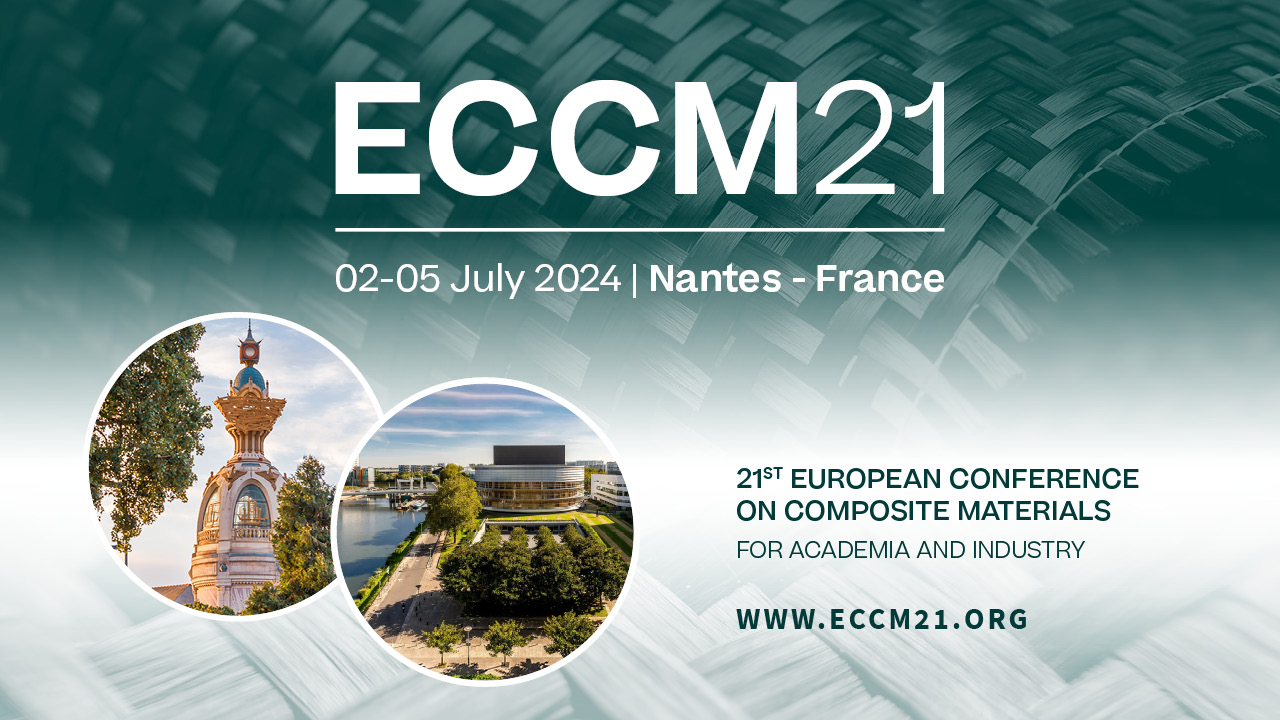Characterization of Thermo-Electromechanical Properties in Smart Composite Structures under Dynamic Loading and Temperature Variations
Topic(s) : Multifunctional and smart composites
Co-authors :
Rogers Kipkoech LANGAT (FRANCE), Emmanuel DE LUYCKER (FRANCE), Arthur CANTAREL (FRANCE), Micky RAKOTONDRABEAbstract :
Background.
The ongoing advancement of smart composite materials with completely embedded active elements remains a compelling focus for numerous industrial stakeholders and researchers, owing to their promising real-world applications in structural engineering [1]. For instance, their capacity to offer self-sensing function for detecting structural defects and even imperceptible impact damage presents a significant advantage that appeals to various sectors, from aerospace to civil engineering [2]. However, for practical applications, understanding their behavior under the dual influences of dynamic loading and temperature fluctuations is essential to harness their full potential. This calls for a comprehensive investigation into the electromechanical properties of these materials over numerous dynamic loading cycles, which can lead to an unstable temperature field. Mastery of the thermal stress and electrically induced strains is of utmost importance because, if not appropriately managed, it can contribute to the degradation and failure of the material and of the structure over time [3]. When heat and electrically induced stresses combine, the material is susceptible to fatigue, warping, cracks, and eventual failure after repeated dynamic loads, threatening the material's overall lifespan.
Procedure
This research produces smart composite materials through the consolidation molding
process, incorporating fiber-reinforced composite materials and embedded piezoelectric elements (see Figure 1.). Thermo-mechanical tests are then conducted on the obtained samples using a dynamic mechanical analyzer (DMA), allowing a thorough evaluation of their electromechanical behavior amidst changing temperature conditions and dynamic mechanical loading. The impact ofthe induced thermo-mechanical stresses and electrically induced strains will be assessed by performing a cross-section scan electron microscopy (SEM) of the composites to verify the structures' microstructure stability after many cycles of testing under various conditions.
Key findings
Thermo-electromechanical behavior is identified from which optimal operating condition of these smart composite materials is proposed.
The ongoing advancement of smart composite materials with completely embedded active elements remains a compelling focus for numerous industrial stakeholders and researchers, owing to their promising real-world applications in structural engineering [1]. For instance, their capacity to offer self-sensing function for detecting structural defects and even imperceptible impact damage presents a significant advantage that appeals to various sectors, from aerospace to civil engineering [2]. However, for practical applications, understanding their behavior under the dual influences of dynamic loading and temperature fluctuations is essential to harness their full potential. This calls for a comprehensive investigation into the electromechanical properties of these materials over numerous dynamic loading cycles, which can lead to an unstable temperature field. Mastery of the thermal stress and electrically induced strains is of utmost importance because, if not appropriately managed, it can contribute to the degradation and failure of the material and of the structure over time [3]. When heat and electrically induced stresses combine, the material is susceptible to fatigue, warping, cracks, and eventual failure after repeated dynamic loads, threatening the material's overall lifespan.
Procedure
This research produces smart composite materials through the consolidation molding
process, incorporating fiber-reinforced composite materials and embedded piezoelectric elements (see Figure 1.). Thermo-mechanical tests are then conducted on the obtained samples using a dynamic mechanical analyzer (DMA), allowing a thorough evaluation of their electromechanical behavior amidst changing temperature conditions and dynamic mechanical loading. The impact ofthe induced thermo-mechanical stresses and electrically induced strains will be assessed by performing a cross-section scan electron microscopy (SEM) of the composites to verify the structures' microstructure stability after many cycles of testing under various conditions.
Key findings
Thermo-electromechanical behavior is identified from which optimal operating condition of these smart composite materials is proposed.

